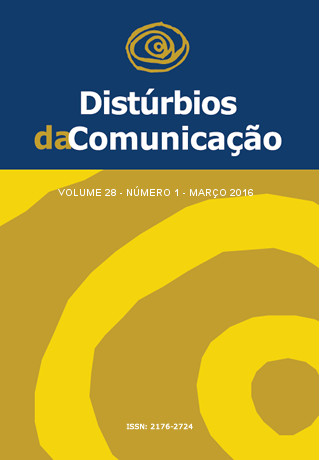Perfil y Salud Mental de los Fonoaudiólogos de una Capital del Nordeste, Brasil
Palabras clave:
Perfil de Salud, Salud Mental, Fonoaudiología, Satisfacción en el Trabajo, AutocuidadResumen
Los profesionales de la salud no se reconocen pasibles de enfermedades físicas y mentales. Objetivo: Describir el perfil y la salud mental de fonoaudiólogos de una capital del Nordeste, Brasil. Método: Estudio descriptivo, transversal, que utilizó el cuestionario Salud Mental de los Profesionales de la Salud. El análisis incluyó las siguientes categorías: características socio económicas, inversión profesional, condiciones laborales, sexualidad, vida familiar y social, abuso de alcohol y drogas, estado general de salud, estrés y sufrimiento psíquico. Participaron fonoaudiólogos de todos los servicios públicos y privados de una capital del nordeste. Los datos fueron analizados de forma descriptiva. Resultados: Población se constituió por 36 fonoaudiólogos con predominio de mujeres, de 31 a 40 años, la mayoría con hasta diez años de carrera profesional. Los datos demuestran que la mayoría de la población trabaja con planes de salud; un tercio está insatisfecha con sus honorarios. La mayoría trabaja de 8 a 14 horas diarias, de 5 a 6 días semanales y algunos no recuerdan cuando fueron al médico por última vez. Algunos revelaron beber semanalmente y otros referieron embriaguez en el último año. Sobre relacionamientos, algunos afirmaron ser infieles, una parte mayor apunta para comportamientos de riesgo en las relaciones extraconyugales. Se detectó que la población presenta fobias y síndrome de pánico; la mayoría se refirió a ya haberse deprimido y algunos han pensado en suicidio. Conclusiones: La investigación reveló indicios de sufrimiento mental y apuntando para la necesidad que tienen estes profesionales de mayores cuidados e inversiónes en la propria salud.Descargas
Los datos de descargas todavía no están disponibles.
Métricas
Cargando métricas ...
Descargas
Publicado
2016-03-31
Número
Sección
Artigos
Licencia
Derechos de autor 2016 Déborah Mônica Machado Pimentel, Neuza Josina Sales, Maria Jésia Vieira

Esta obra está bajo una licencia internacional Creative Commons Atribución 4.0.









